Main Menu

Sturmgepäck (Assualt Pack)
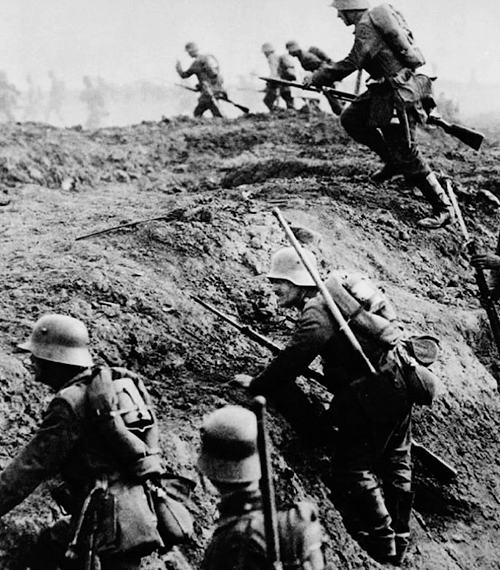 As outlined under the
Complete Soldat
the German soldier in full-marching order carried a full back pack weighing in excess
of 22 pounds. However, during combat operations, being fully loaded was not necessary nor
desired. Therefore, the German soldier developed a streamlined version that actually
eliminated the back-pack and carried only the bare-minimum. The pack is referred to as
the Sturmgepäck or "assault pack".
The Sturmgepäck came in many configurations, but the
basic configuration most practical for our use consisted of the greatcoat (or a blanket) covered
by the tent section and rolled round the mess tin. This basic pack can be seen in the period photo at left.
As outlined under the
Complete Soldat
the German soldier in full-marching order carried a full back pack weighing in excess
of 22 pounds. However, during combat operations, being fully loaded was not necessary nor
desired. Therefore, the German soldier developed a streamlined version that actually
eliminated the back-pack and carried only the bare-minimum. The pack is referred to as
the Sturmgepäck or "assault pack".
The Sturmgepäck came in many configurations, but the
basic configuration most practical for our use consisted of the greatcoat (or a blanket) covered
by the tent section and rolled round the mess tin. This basic pack can be seen in the period photo at left.
The following article describes the construction of the basic Sturmgepäck for the reenactor. The basic Sturmgepäck is constructed using the overcoat (Mantel) roll wrapped with the Zeltbahn. Soldiers at the front were not issued blankets, but not all reenactors own overcoats (Mantel), so this article will demonstrate construction of the Sturmgepäck using a blanket (Decke) with the Zeltbahn.
Mantelrolle (Folding of the Overcoat)
The overcoat is laid, inside down, on the floor. The shoulder straps and
the rear belt are unbuttoned. The tail vent is buttoned (this was not done
for this exercise - the tail vent on the Schipperfabrik M1907 Mantel does
not have buttons) and the collar turned up. The coat is fanned out and
the sleeves laid parallel to the edges.
The rounded bottom edge is folded up in order to create a straight edge.
The bottom corners are then folded in to form a squared off effect. The
sleeves are brought out from underneath and folded so that the cuffs
are even with the edges. (I experimented with this step to determine the
exact amount to fold in the sides so the finished Mantelrolle,
when strapped to the Tornister, would have the ends
even with the bottom of the pack.)
The top collar end is now folded in to a point where the inside
arm holes are visible.
The roll starts from the top by folding the coat over flat, the width of a
hand. This continues until the roll is finished. Folding rather than rolling
gives the proper effect.
The completed Mantelrolle (Overcoat roll).
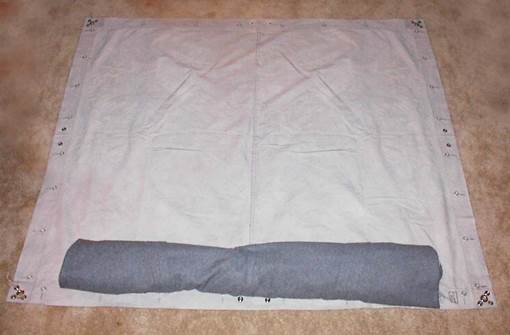
Lay out Zeltbahn (shelter half) with the inside up, the center seam running
vertical, and the neck chord loops at the top. Place the Mantelrolle (Overcoat roll)
at the bottom edge and centered on the center seam.
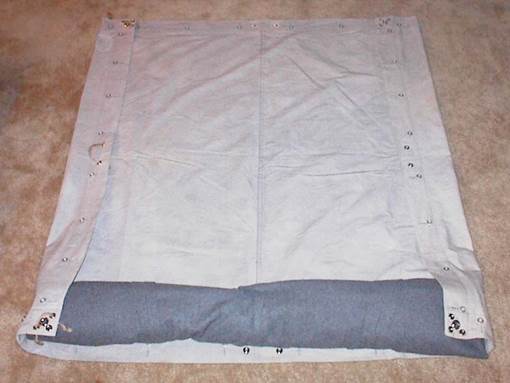
Fold the ends of the Zeltbahn over the Mantelrolle ends.
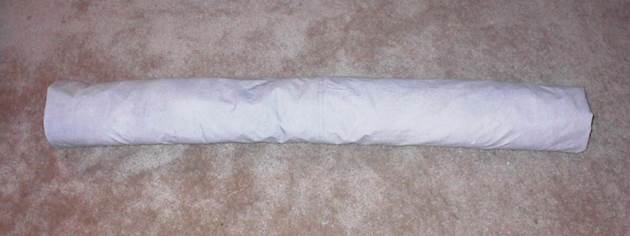
Roll the Manterolle up in the Zeltbahn.
The following steps demonstrate one method for preparing the Zeltbahn/Decke (Blanket) roll for the Sturmgepäck:
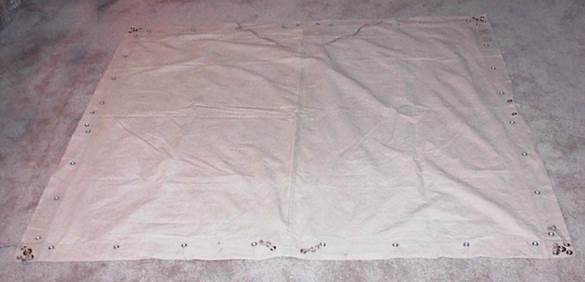
Lay out Zeltbahn (shelter half) with the inside
up, the center seam running
vertical, and the neck chord loops at the top.
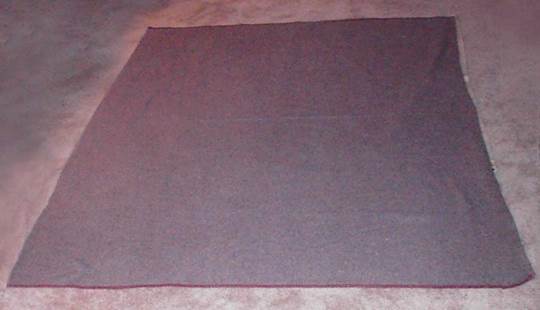
Place the blanket on top, aligning the top edge with that of the Zeltbahn.
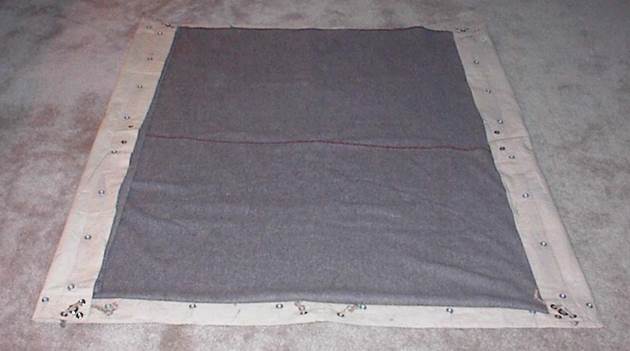
Fold the bottom end of the blanket up so that it is within the bottom edge
of the Zeltbahn. Fold the ends of
the Zeltbahn and blanket over a
few inches on sides.

Roll the Zeltbahn and blanket tightly from the bottom toward the top.
The Sturmgepäck
Now that the Zeltbahn/Mantelrolle or the Zeltbahn/Decke roll have been created, the following steps will be the same for either.
Buckle one Kochsgeschirrriemen (Messkit strap) in the center of the roll (the top of the pack).
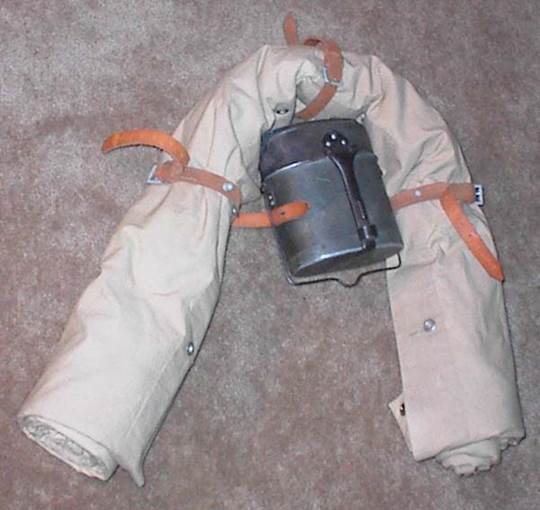
Lay the Messkit with the lid toward the top and wrap the Zeltbahn/blanket
roll down the sides of the messkit. Buckle (2) Mantelriemen at points
roughly in the middle of Messkit with the auxiliary strap ends pointing
away from the Messkit.
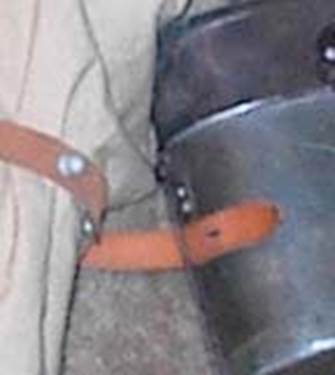
Loop the Mantelriemen ends through the Messkit bail and
attach to their studs.
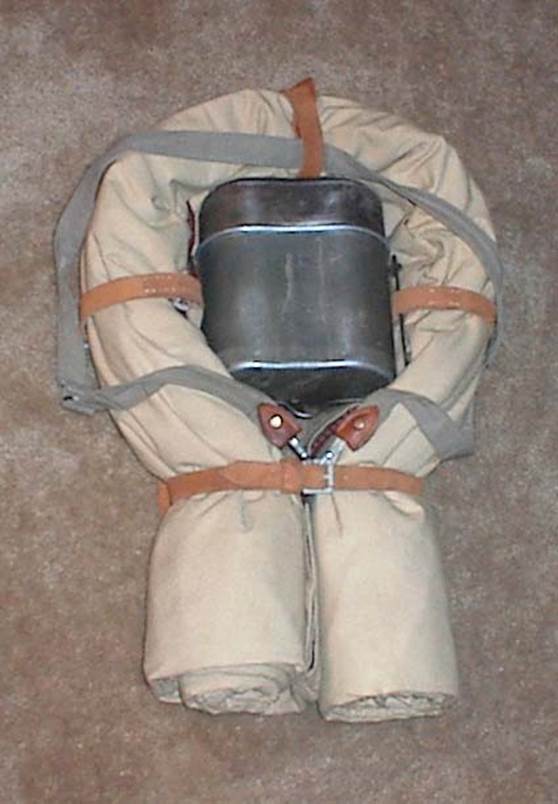
Flip the assembly over and loop a Brotbeutalriemen
(Breadbag strap)
through the Kochsgeschirrriemen strap at the top of the pack. Pull
the Zeltbahn/blanket roll ends together and
buckle a Kochsgeschirrriemen
making sure that the buckle is centered. Hook the ends of the
Brotbeutalriemen
to the buckle. The pack is now complete.
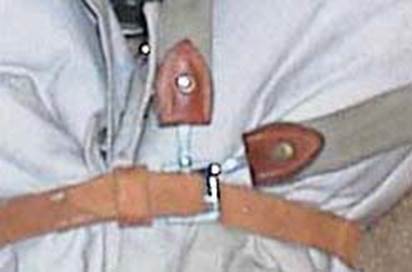
Note: If one breadbag strap does not provide enough length to slip your
arms through, rotate the strap at the top so the buckle is visible on the same
side as the bottom strap. Hook one end of each Brotbeutalriemen to the
top buckle and the other end to the bottom buckle.
Click
Here to download this guide in PDF
(Right click and select "Save link as")